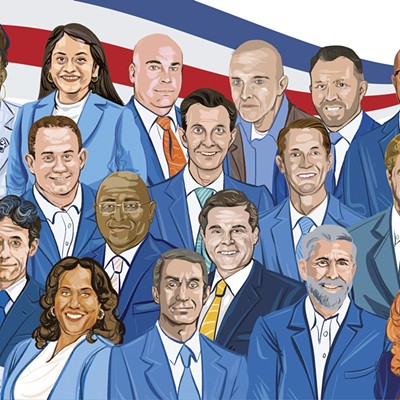Friday, November 6, 2009
Does anyone still care to talk about voter apathy?
It doesn't work.
Among the seven Common Pleas Court judges up for retention this year, for example, was Jeffrey Manning. Earlier this year, you might recall, Manning handed down a somewhat dubious decision related to a Pittsburgh police officer, Paul Abel, accused of pistol-whipping an innocent man in a case of mistaken identity. Abel was off-duty and had been drinking at the time. Manning tried the case, but although he characterized Abel's actions as "inappropriate," he ruled that "It is not the obligation of this court to police the police department."
Now to me, if Manning feels that way, maybe he ought to give up his bench to somebody who does think that's a judge's job.
And a few months before THAT, Manning made another head-scratching ruling involving a former police officer. Sean Deasy was convicted of a DUI offense that killed the passenger in his car, but Manning acquitted him of the most serious charge Deasy faced. As a result, Deasy got six months in a halfway house. Alcohol-awareness groups called the light sentence "inappropriate."
As we reported at the time, securing convictions for DUI-related fatalities is more complicated than it might seem. I'm sure one could argue both sides of the Abel verdict too.
But here's the thing: Nobody DID argue it. The Abel decision especially was controversial. But with a retention vote on the line, nobody -- and I include City Paper here -- thought it was worth talking about. No one.
The result? According to unofficial election returns, Manning didn't just win retention easily -- he did it by a slightly wider margin than some of his colleagues on the bench.
Am I kicking myself in the ass for not raising this stuff before the election? Yeah. Do I think it would have made any difference? Nope.
I used to believe in the principle of judicial elections -- it appealed to my impulse toward Jacksonian democracy. But every year that goes by, I see more evidence that electing these guys has done nothing to ensure accountability. Even if you think Manning should be retained, the fact that there was no debate proves how absurd the process really is.
On a related point, a belated response to this post from Chris Briem, who argues that when you look at how Luke Ravenstahl's challengers have fared in recent elections, "You have to give greater respect to the campaign of Joe Weinroth when he ran for mayor just 4 years ago.
Despite having no money, little support, and running against Bob O'Connor, Briem notes, Weinroth "somehow came out with 27% of the vote in the city of Pittsburgh 2005 mayoral race... I said this before, but you just have to wonder what he might have done if he had had the money or support or the general circumstances Mark Desantis had 2 years later or any of the things going for him that either Harris or Acklin had going for them this time around."
I think the answer to that is simple: If Joe Weinroth had the resources Mark DeSantis had ... he would have done about as well as Mark DeSantis.
I have a theory that in American politics, you can count on roughly 20 percent of the population to support almost any major-party candidate -- no matter who that candidate is. George W. Bush's approval rating, for example, was 22 percent just before he left office. Another 6 months and he might have been at 20, but I think it may be impossible to get any lower than that. 20 percent is probably the Absolute Zero of politics.
In 1997, for example, Tom Murphy defeated Republican Harry Frost handily -- but Frost still garnered a bit more than 20 percent of the vote. And Frost may have been the silliest candidate in the modern history of Pittsburgh politics: If memory serves, the guy had been living on his mom's couch because of problems with his personal finances.
In every election, some of the voters will be cranks, contrarians, people who punch the wrong button because of problems with hand-eye coordination, lunatics, deviants, city Republicans, and other statistical outliers. I don't know what it's like in other cities, but as someone who spends a lot of time using mass transit, I think it's safe to say that such people make up 20 percent of the electorate here. Maybe more.
In honor of Frost, we could call this 20 percent threshhold the "political freezing point" -- if you poll below that, you are probably laid out on a slab somewhere. The real test of a campaign is how many percentage points you can score above that. Weinroth did about 7 points above it, which probably reflects lingering doubts about O'Connor more than anything else. DeSantis got 35 percent. Ravenstahl's two challengers this year combined to get 44.5 percent.
Subtracting that 20 percent of bedrock opposition -- looking only at the votes they earned -- Dok Harris and Kevin Acklin got about one-quarter of the ballots cast. Combined.
Incidentally, there's a bedrock for the number of people who will vote "no" on judicial retention too. No matter how good you are, a certain percentage of people will vote to kick you off the bench. That number appears to be 29 percent. Which is exactly what Manning got.
Tags: Slag Heap









